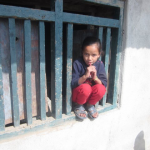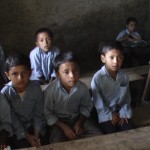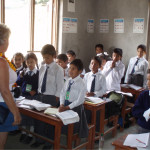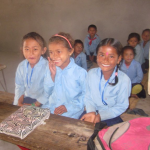by DEEPESH PAUL THAKUR – Information and Advocacy Director of World Vision International Nepal. (deepesh_paul_thakur@wvi.org)
We are pleased to have permission to reproduce part of the article below, published in the Nepal press on 28th May 2011. The photographs have been added from our records.
(World vision is a Christian relief, development and advocacy organisation dedicated to working with children, families and communities to overcome poverty and injustice. Motivated by our Christian faith, World Vision is dedicated to working with the world’s most vulnerable people. World Vision serves all people regardless of religion, race, ethnicity or gender. World Vision started out in Korea in 1950 to meet the needs of children orphaned by the war in Korea. From there, the programme expanded to other Asian nations and gradually spread to nearly 100 countries. World Vision has been working in Nepal for the last 10 years)
———————————————————————————-
 Central to children’s well-being are their rights. Only a constitution with a clear commitment to Nepal’s children will lay the groundwork for government and engaged communities to ensure all Nepali children have a better future and more equitable access to all that development brings.
Central to children’s well-being are their rights. Only a constitution with a clear commitment to Nepal’s children will lay the groundwork for government and engaged communities to ensure all Nepali children have a better future and more equitable access to all that development brings.
Nepal’s children have suffered in extreme ways from the insecure political and security environment in which they have grown up. Many have never known national peace, rather they have seen their families living in fear and insecurity, facing disruption from general strikes (bandas), their schools targeted by politics and their country suffering from economic stagnancy and political division.
 This environment has made it impossible to give children the education they deserve, limited their access to decent health care, and fostered an atmosphere of uncertainty and mistrust. Some 50 percent children under five years are stunted in Nepal. A stunted child is very often damaged for life because the lack of micronutrients permanently impacts children physically, and in particular impairs their mental development. A stunted child is typically deprived of the opportunity to reach his or her full potential meaning they will be lifelong underachievers.
This environment has made it impossible to give children the education they deserve, limited their access to decent health care, and fostered an atmosphere of uncertainty and mistrust. Some 50 percent children under five years are stunted in Nepal. A stunted child is very often damaged for life because the lack of micronutrients permanently impacts children physically, and in particular impairs their mental development. A stunted child is typically deprived of the opportunity to reach his or her full potential meaning they will be lifelong underachievers.
This is not just a severe loss to the children themselves but also to the country’s economic development potential. These are the children who will be prevented from growing into educated, intelligent and productive youth. It is for these children, the future of the country that the constitution should be written timely. Issues of malnutrition, exploitation, violence, neglect, abuse are unchecked and need to be addressed urgently with a concrete child rights structure in the fundamental law of the country.
 Much time has been spent and efforts made to ensure rights of children in the new constitution by two child rights’ coalitions, Children as Zones of Peace and Child Protection (CZOPP) and Consortium of Organisations Working for Child Participation, a network comprising of 72 non-governmental organisations working for child rights. These coalitions have worked predominantly with children through massive consultations at the district and national level to have their aspirations enshrined by the state. Furthermore, initiatives such as capacity building of Constituent Assembly (CA) members in child rights, expert submission (a consolidated documentation of child rights provision), media mobilisation, exhaustive interactions with CA members and formation of a parliamentary forum of child rights advocates were undertaken to highlight the need for the inclusion of comprehensive child rights in the new constitution and associated structures to protect child rights.
Much time has been spent and efforts made to ensure rights of children in the new constitution by two child rights’ coalitions, Children as Zones of Peace and Child Protection (CZOPP) and Consortium of Organisations Working for Child Participation, a network comprising of 72 non-governmental organisations working for child rights. These coalitions have worked predominantly with children through massive consultations at the district and national level to have their aspirations enshrined by the state. Furthermore, initiatives such as capacity building of Constituent Assembly (CA) members in child rights, expert submission (a consolidated documentation of child rights provision), media mobilisation, exhaustive interactions with CA members and formation of a parliamentary forum of child rights advocates were undertaken to highlight the need for the inclusion of comprehensive child rights in the new constitution and associated structures to protect child rights.
An important way of ensuring the guarantee of constitutional rights, other than through the courts, is through the creation of an independent statutory body with responsibility for monitoring rights violations by the state.
CHILD PARTICIPATION
Children should be able to participate and express their views in all matters affecting them. Children should not to be used directly or indirectly in conflict or be manipulated or coerced for political purposes. This needs to be addressed.
 Ensuring child rights in the new constitution will guarantee rights for children throughout the country, irrespective of their gender, ethnicity, religion or race. It will address many areas of children’s rights that will provide a suitable environment for their survival, development, protection and participation. It will most importantly serve as a testimony of the state´s declared responsibility and accountability toward them. It will also prioritise the need to invest in children and allocate more resources for children. With child friendly policies and structures to protect the rights of children, children will be able to live a life with dignity.
Ensuring child rights in the new constitution will guarantee rights for children throughout the country, irrespective of their gender, ethnicity, religion or race. It will address many areas of children’s rights that will provide a suitable environment for their survival, development, protection and participation. It will most importantly serve as a testimony of the state´s declared responsibility and accountability toward them. It will also prioritise the need to invest in children and allocate more resources for children. With child friendly policies and structures to protect the rights of children, children will be able to live a life with dignity.
Amidst so many conflicting priorities of constitution drafting, it is easy to forget about children and their rights. But they should be central to the political debate, especially when children constitute 48.9 percent of the total population. Progressive and timely investment on half of population of Nepal, who are the children, is imperative for Nepal’s future.
Children cannot wait.
